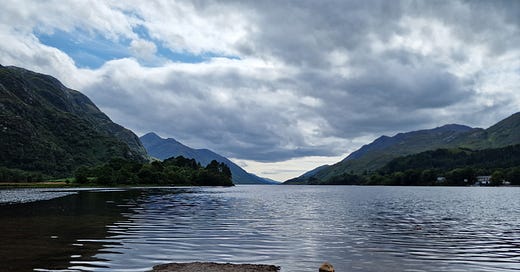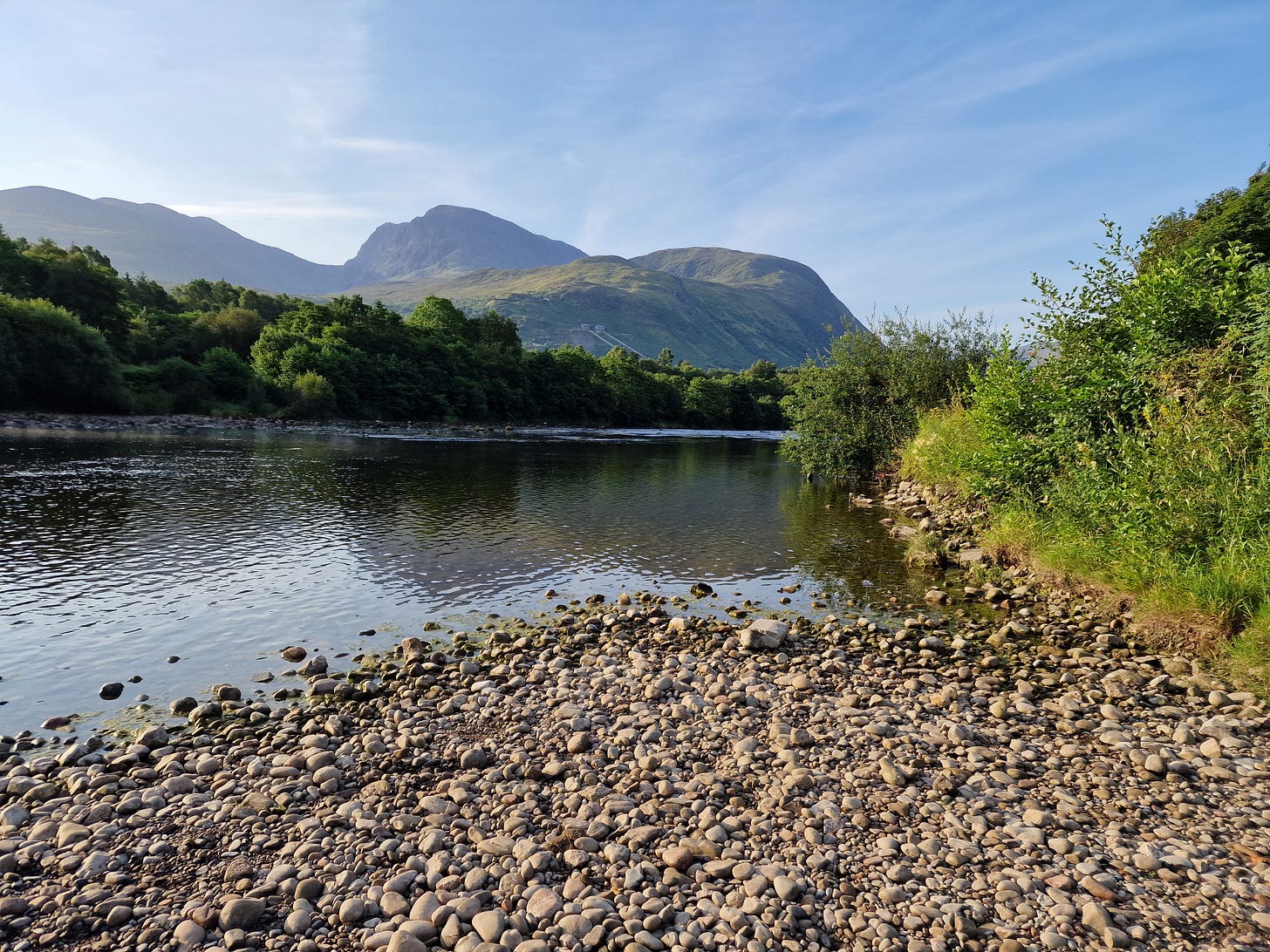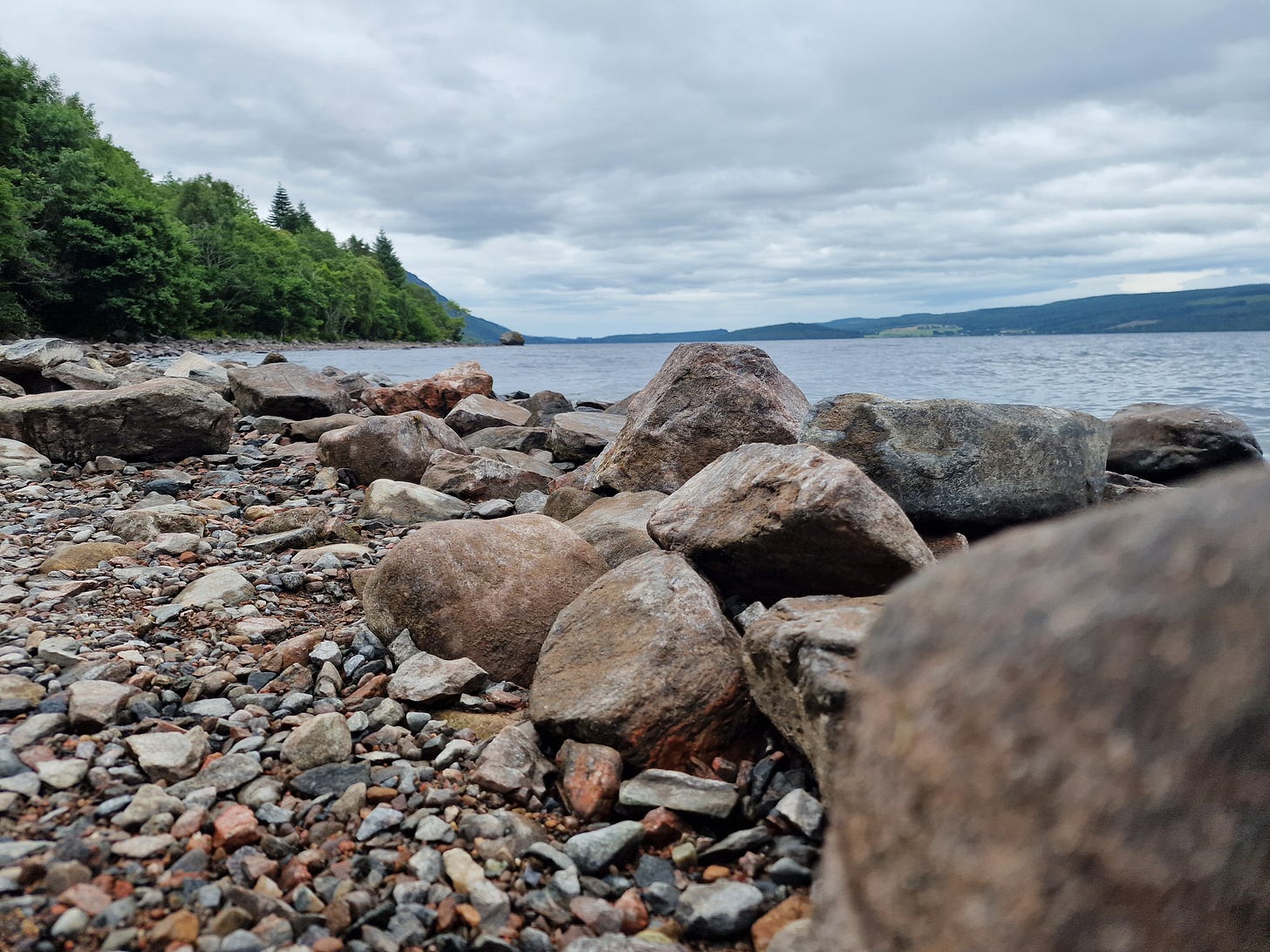How a Trip to the Scottish Highlands Helped Me Find the True Meaning Of Rest
Unplugging in the Glen: Recharging Mind, Body And Spirit
At work, I volunteer as a Mental Health First Aider; one aspect of what I do is write our company's monthly newsletter to raise awareness about mental health and well-being.
Mental health and well-being are topics close to my heart for various reasons. Reasons perhaps initiated by the relative early departure of both my parents and the introspection that followed on my mortality and what truly matters when all is said and done.
Through introspection, I have concluded that so much of life is about its quality, self-awareness, acceptance, and learning to work with what you have.
If only I had known this when I was younger, I would have avoided the futility of chasing unsatisfactory goals and focused more on my happiness and fulfilment.
The Scottish Highlands: A Journey to Rest
Still, it seems almost comedic, if not ironic, that I, a Mental Health First Aider who often writes about the importance of rest, started composing this essay while camping in a serene Glen in Fort William, Scotland.
I am surrounded by green grass, tall trees and the sound of running water from a nearby river— the very embodiment of the restful environment I so often advocate for.
As I write, I smile with a self-congratulatory pat on the back because I recognise how fortunate I am to have found a slither of serenity in the foothills while the sun is shining.
I am shadowed by the towering Grampian range, looking out towards Ben Nevis. I am slowly decompressing and practising what I often write about at work—the importance of bearing the journey towards rest and taking care of yourself.
Inevitably, the serenity of the Highlands, with its rolling mountainous range, provides a stark contrast to the concrete and built-up nature of where I live and my usual routine.
Returning to Daily Life
Returning to daily life after such tranquillity was a jarring experience, which I consider ironic because now, back in my home office, it’s business as usual.
The holiday benefits are barely noticeable, having previously churned through a pile of inconsequential emails; it’s as though the serenity of the Highlands never happened, drowned out by the usual grind.
Holidays have a way of making you question how you spend your time. They remind you of all the good you are missing and how you would rather spend your money, time and energy doing many other things if you could.
I am under no illusion of the necessary trade-off; I need to work to support the lifestyle I am accustomed to and afford the holidays that I now so dearly lament.
But still, in this haze of remembering, I think to myself there has got to be a better way. Surely I don’t have to wish and hope for retirement to enjoy the promise of a better time in life? Where’s the rich relative or winning lottery tickets when you need them?
I know there can be a better way if I am prepared to adjust and do the necessary work, but even that comes with a decision, commitment, and a price.
Still, I think to myself how often we profess to know the theory of many things and yet find difficulty with their execution.
Understanding the Need for Rest
Take the five pillars of health, which centre around nutrition, exercise, mindfulness, sleep and relationships.
Overall, I, like most people, know the benefits, but life seems to have a habit of tugging and pulling my knowledge, will, and motivation in other directions, even when I know it is in my best interest.
I know this, and for the reasons given above and my experience as a master's athlete, I should know better. I should know better as someone who has, on more than one occasion, found myself slipping and sliding towards symptoms that would suggest I was on a path towards burnout.
Sure, I have promised myself and made vital changes regarding what I will and won’t do or will or won’t allow, but here’s the thing: as much as we learn and put into practice, attempts at healthy boundaries we have to evolve and adapt for each challenge we face.
Often, what we allow means we put ourselves in a position where we cope, we manage, and sometimes overestimate our capacity.
It is not until you take time out and put aside things that would otherwise occupy your time and attention that you detect the absence of tension and understand the presence of mental and physical fatigue.
I wonder if noticing a shift is a recognition of how activated my central nervous system was, not because of anxiety or sleep issues, but because of the lack of a heightened state of alert.
Decompression Process
Perhaps that’s why holidays, unlike weekends, have adjustment periods; it takes a couple of days to settle in and leave behind the need to be productive, it takes time to truly let go.
I can do this physically the moment my holiday starts. I put on my out-of-office notification, and I am disciplined and know better than to check in or check emails, but the residue of work and where you place your attention still lingers. It takes time for the effects of that aspect to fade away.
With no deadlines, customers to contact, or unanswered questions that needed my attention, over a few days, I gradually decompressed, letting go of the guilt of doing very little and, at times, nothing.
Routines that once dictated and constrained my daily movements were replaced with simpler routines and my type of bliss, such as a late morning breakfast, carving time out to read, and long, slow walks.
It’s funny; just being should be natural and enough and perhaps our default state, and yet so much of our time is geared towards productivity and striving towards the next thing.
The next thing, always the next thing, can be a trap, especially when we spend too long looking at the horizon and miss out on what is immediately in front of us.
Lesson Learned in How We Carry Stress
During my holiday, this feeling of peace and contentment felt surprising and, in some respects, strange, given the work I have done to allow myself time and space to rest and manage my stress.
But I guess since this is the first holiday this year in which I have taken more than an extended weekend, the feeling should be no surprise.
If there is one thing I have learned from this holiday, it is there is always room to learn and explore more about our health and well-being.
This is self-evident in the noticeable drop in my resting heart rate, which at one point dropped from an overall average of 51 bpm to 47 bpm. It's a humble brag, I know, but it serves the point that if we are not careful, consistently running busy and hectic lifestyles does take its toll, and although we manage, we fall into the snare of merely surviving.
I suppose you could liken it to carrying a comfortable load in a not-too-heavy rucksack. You adjust and adapt, and after a while, you no longer notice until you (or someone else) put more in without taking anything out.
In the past, I have discussed the MHFA England concept of the Stress Container, which describes how we all have varying degrees of stress capacity that fluctuate depending on our circumstances and what we put in and take out.
Stress has an unhelpful habit of sneaking up on us. Perhaps there is a life lesson here: Before we get to our holidays, we should make it a habit of regularly evaluating our stress levels.

Reflections on my Highlands Rest
Even if you don’t do a stress evaluation, holidays have a way of highlighting the load you are carrying. They all have a transition point where, with enough time and a break from our regular routines, we can shift the needle in the opposite direction — and, even if temporarily and for a moment, simply take stock and let go.
Beyond what sometimes occurs with the inevitable holiday indulgence and excess, the act of letting go is essential.
It is an essential life lesson, and it is in this act that we can embrace and shift to a more sustainable lifestyle that will improve our overall health and well-being.
These last few days have served as a healthy reminder that once your basic needs are met, life is to be shared and enjoyed and should be about striving to thrive, not just survive.
As I remember my many country walks and the breathtaking scenery, I am reminded that no matter where you are and what you are going through, awe, wonder, and beauty are always present and to be found in the little things.
Sometimes, we only have to pause and notice and take ourselves outside of what we are used to.
When we do, we place ourselves in a position to appreciate life and remember that just as mountains stand tall and rivers run deep, so can we when we allow time to just be and remember.
We should approach rest not just as physical relaxation, but as an opportunity for deep, holistic rest of mind, body, and soul.
It is not until we step away from our daily routines that we notice the stress we carry.
True rest requires letting go of productivity guilt and embracing the art of simply being.
If quality of life and longevity are your goals, regular, quality rest is essential for maintaining long-term health and preventing burnout.
We are part of nature, and returning to and connecting with who we are can provide numerous benefits and opportunities for self-reflection and growth.
I invite you to consider: How can I incorporate more meaningful rest into my life?
A whole universe is silently waiting for us to expand our horizons and appreciate what we have when we take time to rest.
Thanks for reading. 😊
If you like my story, please consider buying me a coffee:
You may enjoy this from May More - who lives in Scotland!








Such a delightful read, Jesse! The part about the 'Stress Container' really resonated with me. I think we all have that container, and it's easy to keep piling things in without ever taking anything out.
I have yearned to revisit Scotland forever. I had a lovely trip to Edinburgh but now want to book a nice long stay at Findhorn. Were you there, by any chance?